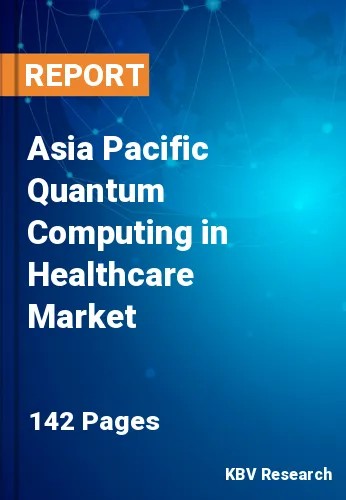The Asia Pacific Quantum Computing in Healthcare Market would witness market growth of 46.9% CAGR during the forecast period (2023-2030).
In the modern, highly interconnected Internet of Things (IoT) digital healthcare framework, which includes connected medical devices (like medical sensors that may be connected to the Internet or the cloud), quantum computing is particularly well-suited for numerous compute-intensive healthcare applications. The development of tailored medicine is now feasible since DNA sequencing can be completed swiftly on a quantum computer. Through rigorous modeling, it can assist in the development of new treatments and medications. Quantum computers may pave the way for the creation of effective imaging systems that provide clinicians with better real-time fine-grained clarity.
In order to advance medical research and drug discovery, QC is expected to make it easier to explore molecular interactions at the most fundamental level. Whole-genome sequencing takes a long time, but qubits make it possible to deploy whole-genome sequencing as well as analytics quickly. The healthcare system may undergo a full transformation as a result of QC's innovative on-demand computing techniques, reinventing security for medical information, anticipating chronic ailments, and accurate pharmaceutical discovery.
India declared its intention to invest more than $1 billion over the following five years in quantum technology development, including a project to construct a scaled-down prototype quantum computer by 2026. In order to speed up research and development guided by quantum computing and enable new scientific discoveries, the Ministry of Electronics and Information Technology (MeitY) of India will open a Quantum Computing Applications Lab there. In order to facilitate advancements in fields including healthcare, the MeitY Quantum Computing Applications Lab will offer quantum computing as a service to government ministries and departments, researchers, scientists, universities, and developers. Hence, the greater involvement of regional nations in the development of technology, along with the expanding healthcare sector, will drive the expansion of the regional market.
The China market dominated the Asia Pacific Quantum Computing in Healthcare Market by Country in 2022, and would continue to be a dominant market till 2030; thereby, achieving a market value of $55,706.8 Thousands by 2030. The Japan market is estimated to grow at a CAGR of 46% during (2023 - 2030). Additionally, The India market would register a CAGR of 47.8% during (2023 - 2030).
Based on Deployment, the market is segmented into On-premise, and Cloud. Based on Component, the market is segmented into Hardware, Software, and Services. Based on Technology, the market is segmented into Superconducting Qubits, Trapped Ions, Quantum Annealing, and Others. Based on Application, the market is segmented into Drug Discovery & Development, Medical Diagnostics, Genomics & Precision Medicine, Radiotherapy, Risk Analysis, and Others. Based on End User, the market is segmented into Pharmaceutical & Biopharmaceutical Companies, Labs & Research Institutes, Healthcare Providers, and Healthcare Payers. Based on countries, the market is segmented into China, Japan, India, South Korea, Singapore, Malaysia, and Rest of Asia Pacific.
Free Valuable Insights: The Worldwide Quantum Computing in Healthcare Market is Projected to reach USD 1 Billion by 2030, at a CAGR of 45.4%
The market research report covers the analysis of key stake holders of the market. Key companies profiled in the report include IBM Corporation, RIGETTI COMPUTING, INC., ID Quantique SA, D-Wave Systems Inc., Google LLC (Alphabet Inc.), Protiviti Inc. (ROBERT HALF INTERNATIONAL INC.), Deloitte Touche Tohmatsu Limited, Accenture PLC and Atos Group.
By Deployment
By Component
By Technology
By Application
By End User
By Country
Our team of dedicated experts can provide you with attractive expansion opportunities for your business.

